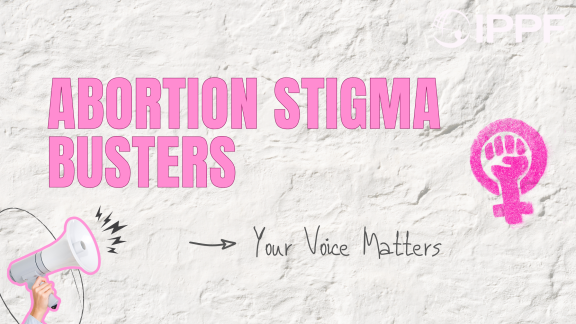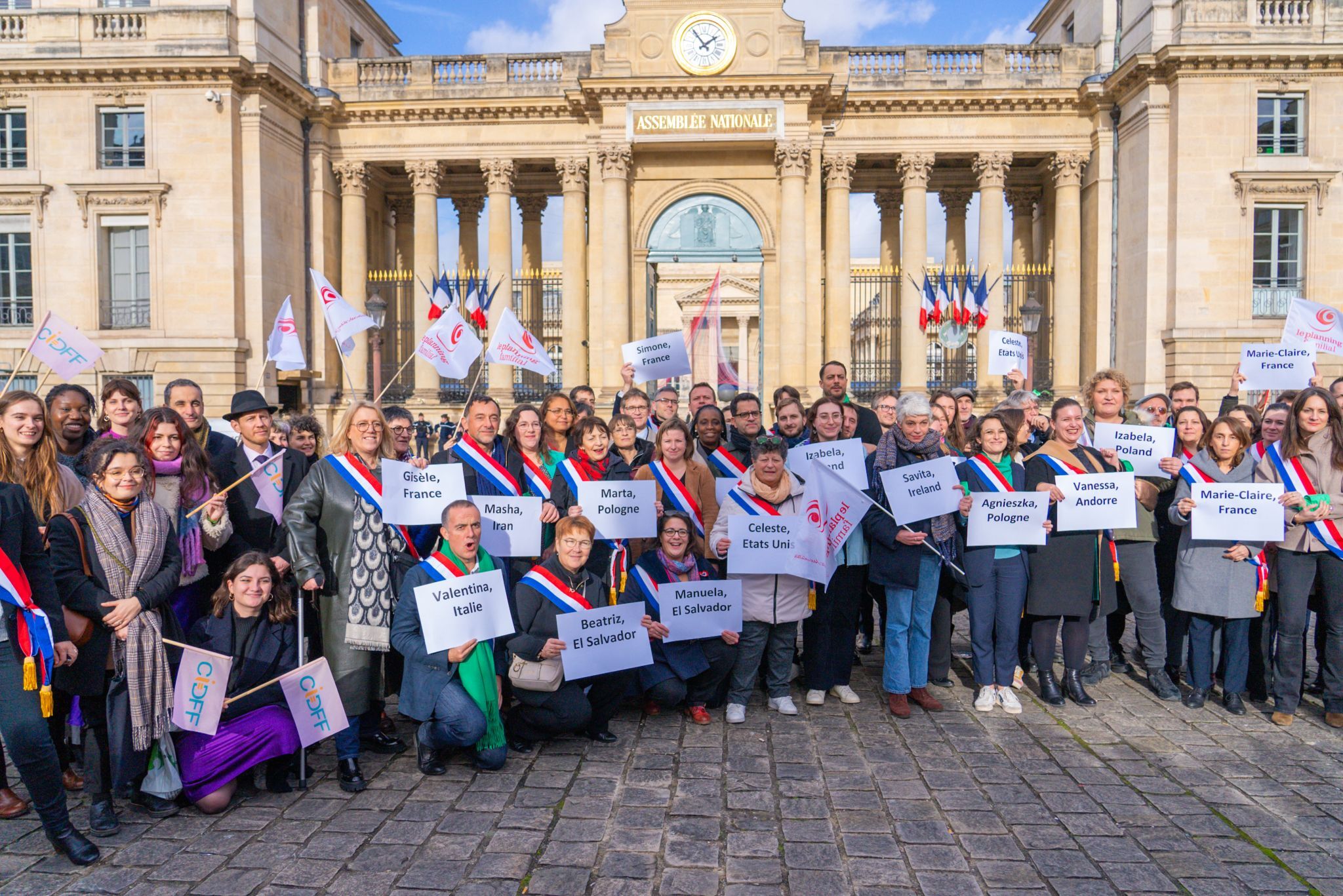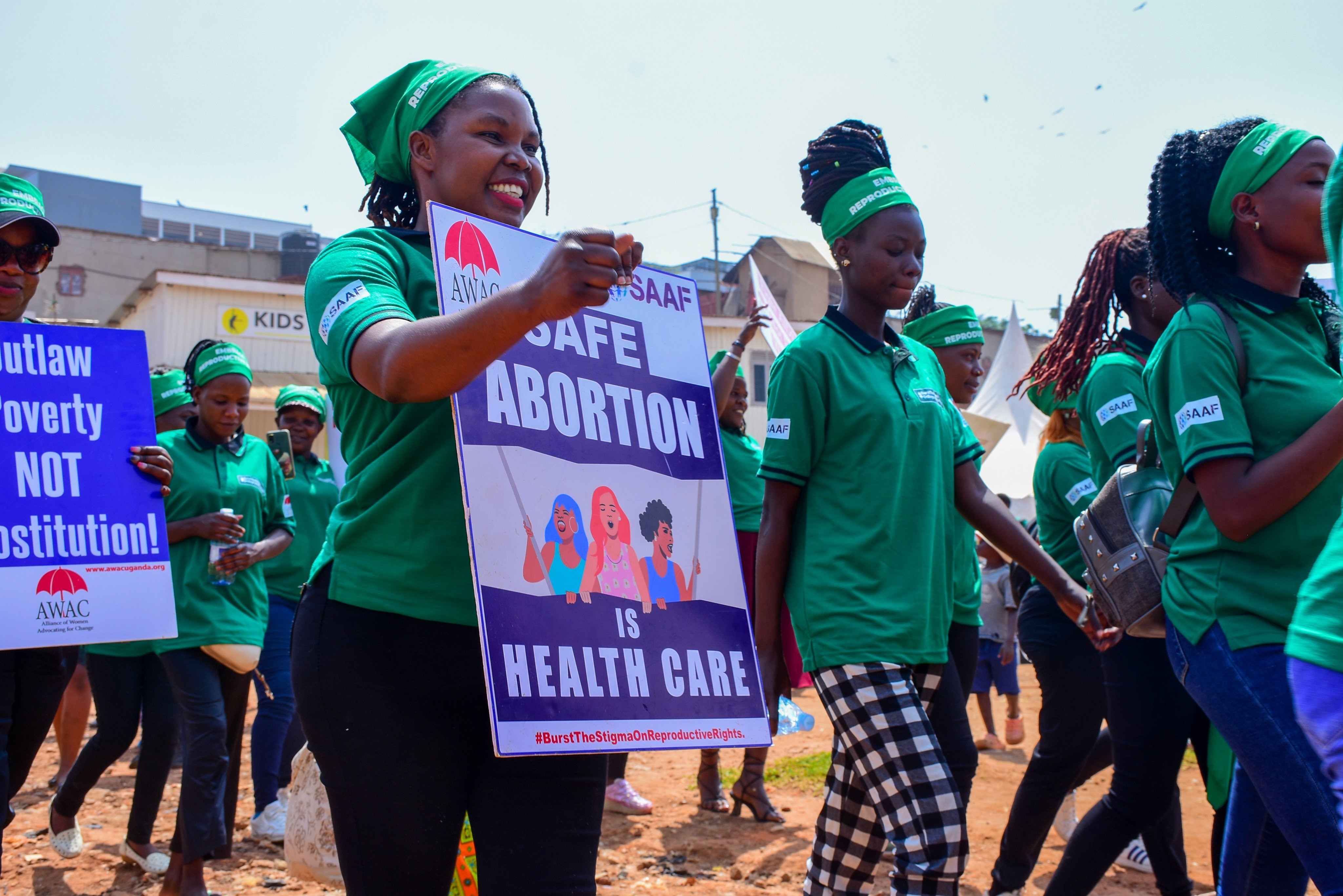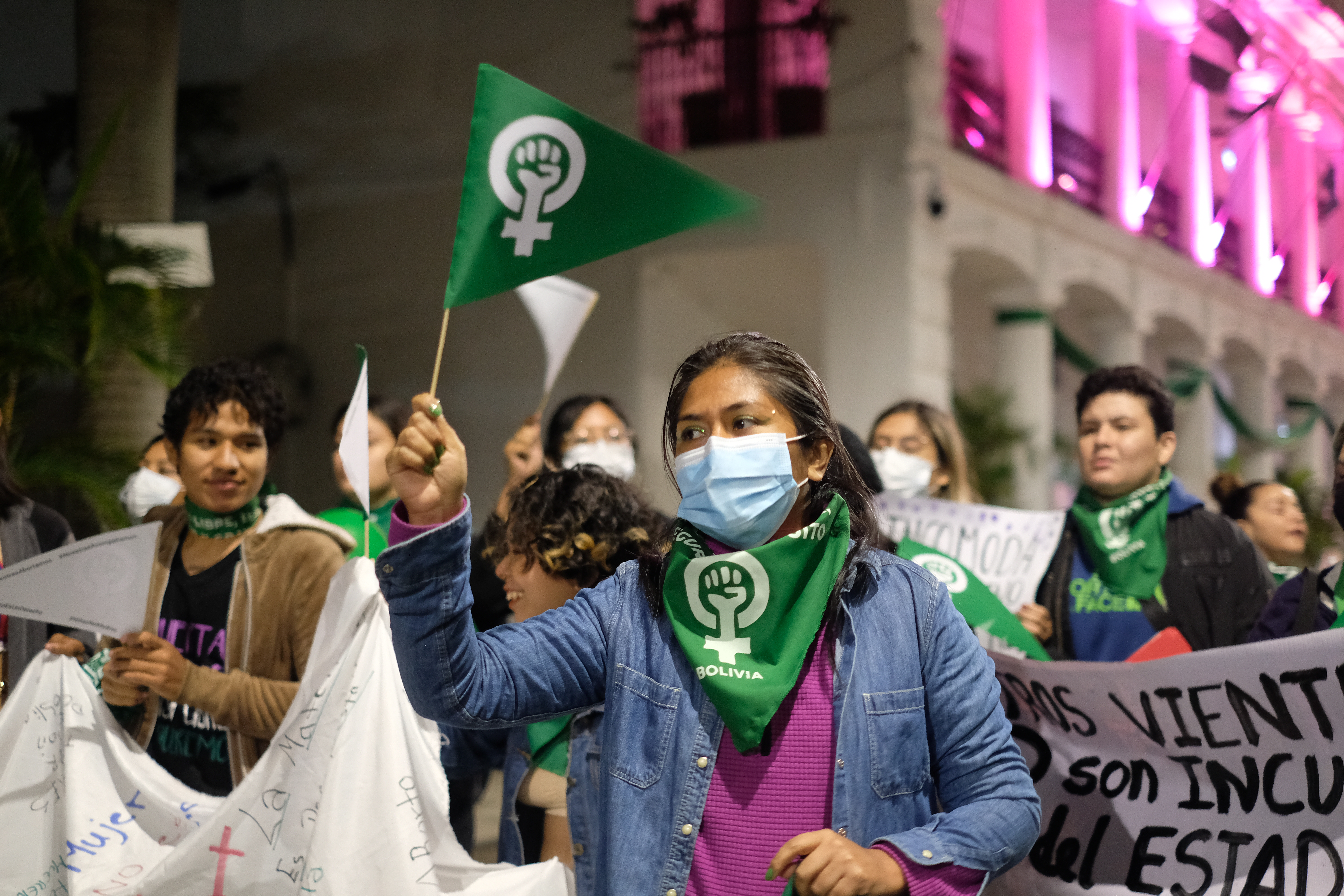Abortion Stigma Busters
Abortion stigma & intersecting barriers block global liberation. Let's dismantle them for lasting change.


IPPF works to ensure that every woman and girl has the human right to choose to be pregnant or not and we will continue to supply and support safe and legal abortion services and care. We are committed to reducing the number of deaths of women and girls who are forced to turn to unsafe abortion methods. Make Abortion Safe. Make Abortion Legal. For all Women and Girls. Everywhere.

June 24th this year marks the second anniversary of the repeal of Roe v. Wade, a seismic shift in the landscape of reproductive rights that has reverberated far beyond the borders of the United States. In June 2022, the US Supreme Court overturned the landmark 1973 ruling which had established a woman's legal right under the US Constitution to have an abortion. This repeal has had global repercussions, further emboldening anti-abortion movements, and influencing reproductive rights debates, policies, funding, and services. In Africa, not only did it send shockwaves, but has also prompted a reflection and re-evaluation of our role as African stakeholders in shaping the future of reproductive rights everywhere on the continent. In many countries on the continent where access to abortion care is already fraught with challenges, this development serves as a stark reminder of the fragility of reproductive rights. It highlights the danger of complacency and the need for vigilance in protecting and advancing these rights and reminds us that abortion is not a moral issue for debate, it is healthcare, and a fundamental human right. While the repeal has sparked renewed activism and advocacy for rights actors on the continent, it has also further emboldened conservative factions and a growing anti-rights movement to push for more restrictive laws and policies through novel tactics to further their agenda. Under the guise of protecting the family, anti-abortion narratives are used as entry points to infiltrate political, legislative and advocacy spaces to roll back hard-won gains. Even going as far as setting up alternative research institutions in Africa to generate quasi-scientific evidence to counter reputed research bodies like the Guttmacher Institute. Increasingly, a key tactic is the weaponizing of First Ladies to further the anti-rights agenda. In Kenya, the National Family Protection Policy, drafted by a major anti-rights group, Citizen Go was launched by the First Lady, despite not undergoing public participation and receiving lots of criticism from rights actors. In Uganda, the Geneva Consensus declaration, an anti-abortion joint statement is making inroads in the country through its affiliation with the First Lady, even though the “Consensus” has no legal or policy underpinning. This trajectory underscores a critical reality: Nothing is safe, our continent is a battleground for the ideological struggles taking place elsewhere in the world, sadly, our human rights, including SRHR are at the highest risk. We must forge our own path, grounded in the unique political contexts of our nations through our partnerships with local organizations and governments. As one of the leading voices on SRHR advocacy and services in Africa, IPPF believes now is the time for Africa to assert its leadership in the global fight for reproductive justice. In collaboration with other key actors on the continent and beyond, IPPF is committed to continue playing a pivotal role in the SRHR landscape of Africa. We will continue to expand access to abortion care, especially for the most vulnerable and marginalized, comprehensive sexuality education, contraceptive services and reaching those in humanitarian settings. Despite these efforts, much work remains. The disparities in access and the entrenched stigma surrounding abortion care continue to hinder our progress. One of the key initiatives we are proud to be part of is the CATALYSTS Consortium, which was born out of this landmark ruling in June 2022. Following the ruling, IPPF Africa Region, Ipas Africa Alliance, Centre for Reproductive Rights Africa, Population Council Kenya and FIGO came together to discuss the ruling’s implications on the continent and consider the case for an abortion consortium that might more effectively protect and promote abortion rights in Africa. Launching on June 27th, the Consortium has set an ambitious and unambiguously comprehensive vision for abortion care for all in Africa. This type of organic consortium on abortion has not yet been attempted. As African thought leaders, field builders and a vehicle for driving accountability, we are a Consortium of the brave with a track record of never backtracking. Our solution is powerful, impactful, and led by those doing the work while building an African critical mass that can effectively open doors, advocate more strongly and underpin bolder action. CATALYSTS is Africa-led, committed to decolonizing, and reframing the discourse around abortion rights in Africa by centring African perspectives, experiences, and voices. But we cannot achieve our goals in isolation. It is imperative that African governments, activists, youth groups and other civil society groups recognize the urgency of prioritizing reproductive rights. Governments must decriminalize abortion, ensure access to contraceptives, and protect the rights of individuals to make informed choices about their reproductive health and rights. Cross-border activist solidarity is imperative if we must move the needle on reproductive justice, and young people should be recognized as not just a passive group with SRHR needs but as critical actors at the centre of the journey towards reproductive justice. IPPF ARO stands ready to champion this charge, but we need the support and collaboration of governments, communities, and international partners. CATALYSTS launches on June 27th after close to two years of consultation, course correction, investment, and realignment. I invite you to join us in bringing this vision to life, which will be marked by the unveiling of the website, Theory of Change, and call to action. It promises to be a celebration of our collective achievements and a testament to the transformative power of collaboration. As we mark the second anniversary of the Roe v. Wade repeal, the stakes could not be higher for African SRHR actors. The urgent need for a unified and proactive approach to safeguard and advance reproductive rights on the continent is imperative as the path forward requires bold action, unwavering commitment, and a collective direction. For us, the lesson is clear: They are coming for us, bolder, stronger, and more organized, and we cannot depend on the legal frameworks or political will of foreign nations to safeguard our reproductive rights. Instead, we must strike back and reclaim our narrative, and enforce our own robust policies that reflect the needs and realities of our people.

This is a serious time. The results of the European elections mark a worrying turning point, with the rise of the far right across Europe and, above all, their sweeping victory in France. The results in France overwhelm us, with almost 38% of votes cast for far-right parties. We know that these parties undermine the rights of women, LGBTQIA+ people, gender equality and the rights of migrants and people far from the law. Their anti-choice, anti-feminist, racist and hateful political project endangers Le Planning Familial's actions towards all the people we support. These results come against a backdrop of increasing attacks on Le Planning Familial organization over the past few years, whether in the press, on social networks, through calls to cut our subsidies, or worse, directly against our local branches. When we attack Le Planning Familial organization, we jeopardize the reception of people who need to come to our clinics: those who come for an abortion, to access free contraception, those who are accompanied in their gender transition, women who are victims of domestic violence who come for support and a sympathetic ear, the young, the not-so-young, women in precarious situations... We are not fooled by these attacks, which are the work of a normalized extreme right and conservative anti-choice movements that are highly organized and ultra-funded! Our progressive actions are disturbing the extreme right, which is opposed to the evolution of society towards equal rights and access to healthcare for as many people as possible in France and Europe. The European Parliament, the most progressive of the European Union's three institutions, has been a long-standing ally on gender equality issues. Planning familial was actively involved in the European elections, drawing up a manifesto with our recommendations for a feminist, supportive and inclusive Europe, meeting with various MEPs and analyzing the platforms of the main candidates. The new composition of the Parliament, with a more conservative majority, calls this dynamic into question. Nevertheless, we will continue to work with our new allied MEPs to advance sexual and reproductive rights in Europe. Despite these alarming findings, Le Planning Familial will not be silent, will proudly stand by its values and will continue its actions. We have 18 days left before the parliamentary elections to mobilize. It's important for many of us to take to the streets all over France this weekend, to show our support for our model of society and the values we defend. The challenges ahead are great, but Le Planning Familial will always be there to defend and advance human rights for all European citizens. Together, as feminists, in solidarity and in anger, we will resist! Thank you for your unfailing support. Feminist solidarity, Sarah Durocher President of Le Planning Familial To support Le Planning familial click here
Abortion stigma & intersecting barriers block global liberation. Let's dismantle them for lasting change.


Over the past 30 years, more than 60 countries and territories have liberalized their abortion laws. Only four have regressed, including the United States. Abortion rights are increasingly becoming recognized as fundamental human rights for millions of people worldwide. The global landscape of abortion rights continues to evolve in 2024, with new legislation and feminist movements fighting for better access. Let's take a trip around the world to see the latest developments.

The enshrinement of the right to abortion in the French Constitution has been a historic demand of feminist organizations since I can remember. But for the past decade, this demand has had little resonance with the French population. Many felt that the Constitution would not have to be invoked to defend this right. I would even go so far as to say that many thought that this right was not at risk. But then, two years ago, the US Supreme Court overturned Roe V. Wade and everything changed. Millions of people suddenly realized that, unfortunately, the right to abortion can be won and then lost. It's an ongoing battle. On 28 February, France’s Parliament will make its final decision on whether or not to pass the constitutional abortion bill. To succeed, we need the support of the international community. The COVID crisis and the need to expand access to abortion To understand the impact of the US Supreme Court's decision on France, it is necessary to look at the context of abortion rights advocacy in our country. During the COVID crisis, the Mouvement Français pour le Planning Familial - commonly known as 'Le Planning Familial' - joined forces with feminist associations, health professionals and Members of Parliament to ensure access to abortion care during lockdown. Our mobilization triggered an increase in media coverage of the issue: women of all ages began to share their own abortion stories. Thanks to their courage, we managed to bring to light the existing obstacles to access abortion in France. We focused our advocacy on one main barrier: the legal time limit - 12 weeks of pregnancy - to access abortion. We knew that some women would not be able to get an abortion within this time because of the lockdown. Pregnant women reached out to us by calling our national hotline and our local centers as they were unable to leave their homes because of domestic violence, as well as minors. We knew that, by the time the lockdown was over, they would have exceeded the abortion time limits and would be forced to continue through pregnancies against their will. Over the months, our advocacy campaign evolved into a demand for a legal change to permanently extend the time limit for accessing abortion care in France. It was a long political battle. We celebrated a great victory on 2 March 2022: abortion time limits were extended by two weeks. It was at this point that we saw a significant increase in support: French people who had previously been silent on the issue of abortion began to speak out. Meanwhile, the anti-choice and anti-rights groups intensified its attacks against us. In the space of a few months, they broke down the doors, the windows and the locks of many of our local centers. Online and in-person threats were sent to our members across France.

As we ease into 2024, abortion continues to hit the headlines. Especially since so much global news is focused on what is happening in the US, where politicians continue to block access to basic reproductive rights. Though we may hear less about restriction of safe abortion in other countries, tens of thousands of women are still dying unnecessarily because of politics. Afterall, we already have the technical knowledge and resources to perform abortions safely. As the World Health Organisation points out, abortion is a simple healthcare intervention, and deaths from unsafe abortions are preventable. But due to prohibitive laws and policies, entrenched stigma, and crumbling health care systems, not everyone can access safe care when they need it. SAAF is the only global funder solely dedicated to abortion. Hosted by IPPF since our founding in 2006, the Safe Abortion Action Fund (SAAF) has provided $69 million USD to global organisations seeking to tackle the unnecessary deaths and harm caused by a lack of access to safe abortion. We are currently providing support to over 80 organisations in low- and middle-income countries around the world. We wish we didn’t need to exist, that every country would provide its citizens with access to safe, legal abortion care (and contraception) when they need it. Unfortunately, the need for funding to support safe abortion care and advocacy is just as relevant as when we were founded. Our first call for funding in 2007 received 222 applications, our most recent in 2022 attracted 1191 applications, from 90 different countries.

The recent inauguration of the ultra-right-wing Argentinian President Javier Milei is a stark reminder of the fragility of our rights to our own bodies. Within a week of taking office, the self-described libertarian, who is openly anti-abortion and sexist, slashed the number of government ministries in half and delivered on his promise to eliminate the Ministry of Women, Gender and Diversity in the name of austerity. Although Milei's definitive plan for the newly formed and arbitrarily named ‘Ministry of Human Capital’ is not yet known, his famous phrase "there is no money" is a clear signal that sexual and reproductive health, rights and justice will not be on the agenda. Milei has said so himself: he has vowed to hold a plebiscite on whether to repeal the country’s 2020 landmark legislation of abortion, has attacked the 2006 law which recognizes’ students’ right to comprehensive sexuality education, routinely portrays LGBTIQ+ people as a menace to Argentinian society and denies the existence of the gender gap. But the need for a robust and well-funded public health service in Argentina, one that provides integrated sexual and reproductive healthcare services, is of vital public interest.

The below is a joint press release between Amnesty International, the International Planned Parenthood Federation, MSI Reproductive Choices, the International Federation of Gynecology and Obstetrics (FIGO), International Confederation of Midwives and Ipas. People who are defending the right to abortion and providing essential services are being stigmatized, intimidated, attacked and subjected to unjust prosecutions, making their work increasingly difficult and dangerous to carry out, said Amnesty International in a new report out today. The report, An Unstoppable Movement: A global call to recognize and protect those who defend the right to safe abortions, reveals how many healthcare workers, activists, advocates and accompaniers around the world face abuse, arrest, prosecution and imprisonment for supporting the right of women, girls and people to access abortions. Such an environment is prevalent including in countries where abortion is partially allowed by law. It is having a chilling, silencing and stigmatizing effect on all those defending access to abortion, as they live in constant fear of being attacked and prosecuted for providing abortion care, whether it is legal or not. It is also creating major barriers for women, girls and people who need abortion care – particularly those who are most marginalised. “The right to abortion is not an opinion. It is a matter of international standards and international legal norms. It is a right underpinned by many human rights, including the rights to physical and mental integrity, the right to health and the right not to be unlawfully and arbitrarily killed through the withdrawal of safe services. It is essential for the dignity of all women and girls, and of everyone who can become pregnant. Those who defend and enable exercise of that right deserve our respect and protection. Yet, many States around the world persist with policies of over-regulation and criminalization that generate hostile, even perilous environments for those who defend the right to abortion,” said Agnès Callamard, Amnesty International’s Secretary General. “Anti-abortion rhetoric, policies and laws stamp a target on the backs of health workers and advocates. Stigmatized, abused, discriminated against, criminalized, imprisoned, even killed - the rights of those who defend the right to abortion are under attack. But their human rights to work without fear, to provide essential services without threat, to exercise their professional skills without discrimination, must be respected and protected.” Isolated and unsupported While progressive abortion law reform continues, anti-abortion regressions impede access with the promotion of disinformation and toxic narratives - smear campaigns that hijack public discourse and agitate against the right to abortion and against those who defend it. “For many sexual and reproductive health providers this harassment and abuse has come to feel like just part of the job, but we cannot allow this to become the new normal,” said Sarah Shaw, MSI Reproductive Choices’ Head of Advocacy. “Enough is enough. It’s time to recognise abortion providers as human rights defenders and stand up for those who put their lives on the line to make choice possible.” Throughout the report, based on more than 40 interviews with abortion rights defenders from all over the world and with the support of global healthcare and grassroots organizations, people defending the right to abortion, particularly healthcare workers, explained how they often feel isolated and unsupported. Their work is not recognised, and they are left fearing the threat of criminalization, harassment, stigmatization, verbal threats and violence, as well as ostracization and burnout in the workplace. Some health workers have seen their personal details leaked online, while others are unsure whether they’ll make it home safely. For example: Venezuelan teacher and human rights defender Vannesa Rosales was criminalized for helping a woman and her 13-year-old daughter get access to abortion. In Poland, Justyna Wydrzyńska, a member of Abortion Without Borders and the Abortion Dream Team, was convicted for helping a woman access abortion pills earlier this year - a safe way of terminating a pregnancy. In Ghana, an advocate for sexual and reproductive rights said service providers have experienced physical violence and public shaming by members of the public, for educating people about contraception. “Violence against frontline sexual and reproductive health care providers is something that continues to happen unabated; it's about time the voices, experiences and concerns of our frontline defenders are heard,” said Alvaro Bermejo, International Planned Parenthood Federation’s Director General. “As anti-abortion authorities around the world continue to deploy stigma, fear and hate-speech against those seeking and those providing services, we, as institutional champions of sexual and reproductive health and rights, commit to matching the courage of our frontline defenders.”

Restrictions to safe, legal abortion care are in place all over the world. A handful of countries ban the procedure in every circumstance, but nearly all place limits on who can have an abortion and when. Abortion is often criminalised, and nearly always stigmatised. Despite all this, abortions still happen. In fact, abortion rates in countries where abortion is heavily restricted are similar to those where it is mostly legal. Every year, millions of people are able to circumnavigate oppressive legal systems and practical obstacles to end their pregnancies by choice. They are able to do this because of abortion rights activists. Activists are succeeding in changing laws, as well as hearts and minds News headlines are often dominated with stories about the devastating impact of abortion bans in the US. But the global picture is more positive. According to the Center for Reproductive Rights, more than 60 countries have liberalised their abortion laws in the past 30 years. Only four (including the US) have regressed.

In recent years, digital technologies have transformed the landscape of healthcare, including the provision of quality abortion care. With the COVID-19 pandemic forcing many clinics and hospitals around the world to close or reduce services, digital health became an essential part of abortion care. Even as clinics resumed pre-pandemic operations, digital abortion care has remained critical for supporting self-managed medical abortion and reaching women in countries with restrictive laws, those living in remote areas, or those seeking discreet and convenient care. However, digital pathways are just one part of a larger ecosystem of abortion care. To ensure a seamless continuum of person-centered care, the integration of digital abortion care with analog pathways is essential. Analog pathways refer to the traditional client journeys that do not involve digital components. The Need for Integrated Care Pathways When digital pathways are disconnected from analog pathways, women and other people seeking abortion care may encounter unnecessary delays or struggle to access the care they need. For instance, a woman consulting a digital provider for information on self-managing a medical abortion may face difficulties obtaining the necessary medication or post-abortion care without access to local health services. To ensure that women can access quality care at every stage of their abortion journey, it is crucial to establish linkages between digital providers and physical access points. The Success of the WFD-IPPF Partnership The referral partnership between safe2choose.org (a Women First Digital platform) and the International Planned Parenthood Federation (IPPF) has successfully linked digital and in-person pathways to abortion care. The referral process is straightforward. Women seeking abortion care can access safe2choose's digital platform to receive counselling and information on medical and surgical abortion options. If the woman prefers in-person care or needs further medical attention, the safe2choose team of trained counsellors will refer her to the nearest provider. This referral process ensures that women can choose a hybrid model, receiving continuous care and support from trained healthcare providers throughout their abortion journey. Since its inception in 2021, the safe2choose partnership with IPPF has registered 300 providers from IPPF Member Associations in seven countries in Africa and Asia. In the first two years, safe2choose referred over 3,600 clients to IPPF facilities, where they received quality abortion care. This collaboration has significantly enhanced the abortion care ecosystem, ensuring comprehensive and uninterrupted care for women. Clients connected to local providers through the digital safe2choose services consistently report positive experiences. They appreciate the easy accessibility and proximity of the local providers, as well as the clear and comprehensive information provided. These testimonials highlight the effectiveness and quality of the referrals, building trust and confidence in local IPPF providers. Moving Towards a Seamless Continuum of Care The IPPF and safe2choose referral partnership continues to expand, encompassing providers from more countries and extending the availability of a hybrid model of abortion care to more women worldwide. IPPF Member Association clinics and providers can sign up to the safe2choose referral database through an online registration form. By forging collaborative links between digital and in-person providers, we can move towards a comprehensive abortion care system that fully addresses the needs of women. The success of the safe2choose-IPPF partnership highlights the importance of collaboration between digital and in-clinic providers to create a world where all women have access to quality abortion care. Discover additional information about the safe2choose referral process here.